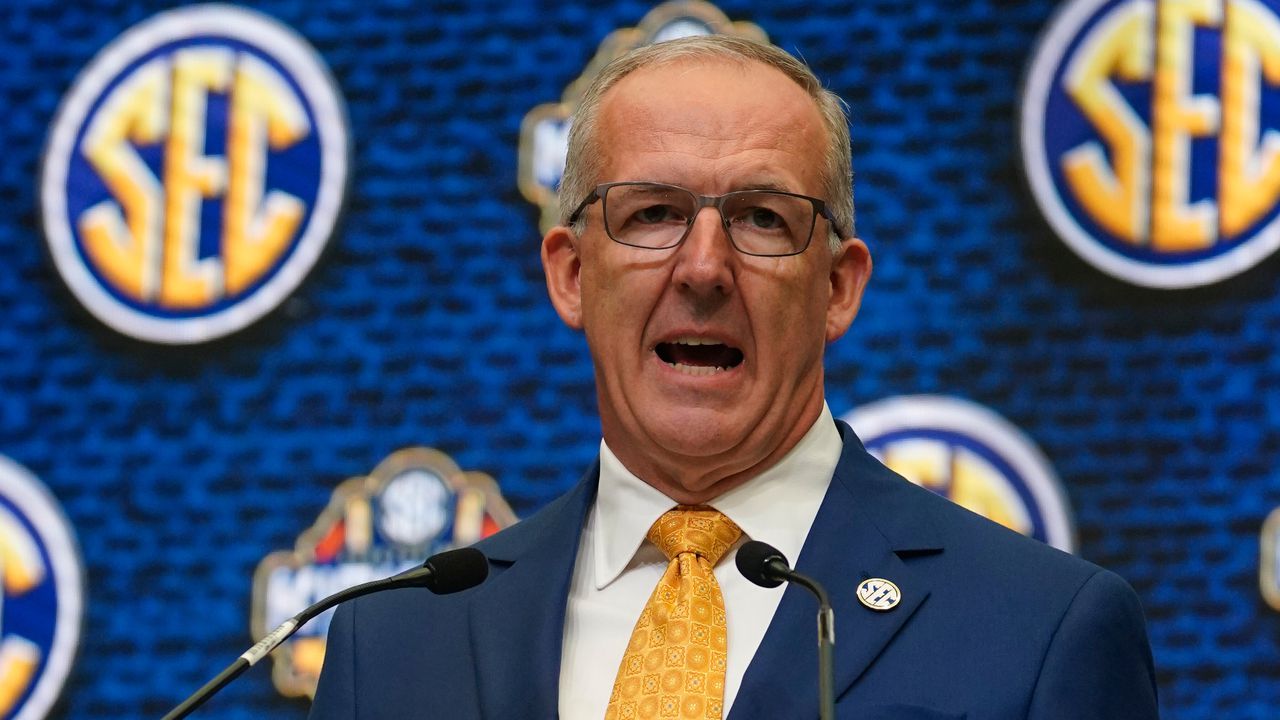SEC commish lends insight into football scheduling debate
Ever careful with his words, Greg Sankey on the eve of a consequential SEC spring meeting toed the line Monday night on the hot topic of the week.
Meeting with a small group of reporters in the Destin hotel hosting the event, the league commissioner listed pros and cons of what could be a heated debate over playing eight or nine league football games beginning in 2024. That comes in the shadow of reporting from Sports Illustrated that involved a stop-gap measure that could push the long-delayed decision further down the road.
“We’re poised to make a decision,” Sankey said, “but time is still an asset.”
Sankey didn’t necessarily rule out a one-year eight-game schedule in 2024 as reported by SI on Monday but said they’d prefer to gavel this discussion closed after years of indecision.
“A league at the forefront of college athletics doesn’t stand still,” Sankey said. “And this is a league at the forefront of college athletics. Whether changes happen immediately is part of the careful consideration and the deep consideration. You can make arguments around both.”
Regardless, the scheduling process will be evolving with the addition of Texas and Oklahoma after this coming season, it’s just a matter of how different things will look. The current eight-game model would allow every league team to face the full roster of schools in a two-year window but cut out a few core rivalry games to achieve that.
The nine-game model would include three fixed annual games with a rotation of six others — keeping annual rivalries like Alabama-Tennessee and Auburn-Georgia intact. The eight-game model would have those games every other year with each team hosting once every four years.
But after sounding certain of this process reaching a conclusion when addressing reporters in March the SEC basketball tournament, Sankey was less certain this would be resolved by the end of the week. He noted the onboarding process during expansions in 1992 and 2012 wasn’t always smooth in terms of scheduling format.
“I don’t have a lot of angst that we have to decide,” Sankey said. “I would prefer to not continue to circle the airport with the airplane. I’d prefer to land it.”
As discussed in the SI piece, among the issues causing hesitancy with adding a ninth game are concerns with the new TV deal set to begin with ESPN in 2024. Would there be more money in the pot given the higher inventory of SEC game? That remains to be seen and could be a sticking point for those resistant to change.
While Sankey said that money wouldn’t be the primary driver of that decision-making process, he also noted there’d be more revenue from sources other than TV. Ticket income, for example, spikes from intra-conference games instead of contract games with non-Power 5 competition.
Considerations of balance and equity — harder to define parameters — have been part of the discussion.
“The more you play,” Sankey said, “the more equitable the conference schedule is. So if you played that out to all 12 games, your champion versus your ninth-place team or 16th-place team would have had a very narrow band of competitive disparity.”
Asked to clarify if he meant that a nine-game schedule would equate to more fairness, the commissioner’s reply was brief.
“Yes,” Sankey said.
Was that necessarily his preference? No.
“I think it would be disrespectful of me to give that information to you right now when I’m obligated to members who have to make a decision,” he said. “They’d rightfully be angry with me.”
That said, he wouldn’t be shy when it came time for the 16 university presidents to vote.
“I’ve allowed intentionally the conversation to play out without taking a position,” Sankey said. “I have made clear what I think should eventually happen inside the room.”
He cited the decision-rich summer of 2020 as an example of when he stepped in and made his position known when the league was discussing logistical elements of a football season amid the COVID-19 pandemic.
It would take a simple majority of votes from SEC presidents for any model to pass when it comes time to vote and there have been close ballots before. New rules on intra-conference transfers, for example, ended with an 8-6 vote a few years back.
Now there are 16 perspectives and agendas in play. Resolution appeared to be on the horizon last year in Destin, now a year later, nothing is certain when the conference rooms at the gulf-side resort open for what could be an eventful debate.
Michael Casagrande is a reporter for the Alabama Media Group. Follow him on Twitter @ByCasagrande or on Facebook.
